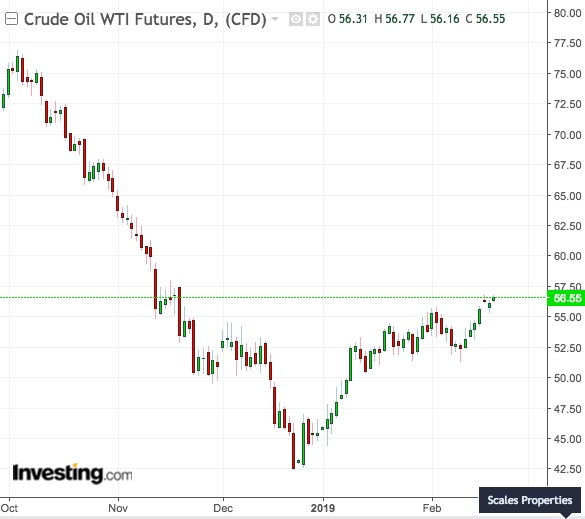Shale oil is setting new production records, threatening the Organization of the Petroleum Exporting Countries with another showdown that could upend the market as U.S. crude prices cross $55 per barrel.
To complicate matters, Saudi Arabia, which dominates OPEC, has become so aggressive in cutting production that it’s even willing to cede market share in Asia, its most prized destination, in order to get to its desired target of $80 per barrel. Any export void the Saudis leave in the region can easily be replaced by U.S. competitors. Proof: the first annual export-term contract announced by India this week for U.S.-origin crude grades.

John Kilduff, founding partner at New York energy hedge fund Again Capital, said that when U.S. West Texas Intermediate crude sank beneath $43 a barrel last year, high-cost shale producers were on the verge of being shaken out of the game like in 2015-2016.
But the Saudis gave these operators a new lease of life by cutting production and boosting crude prices.
Said Kilduff:
“When it comes to production cuts, it may be a question of damned if you do and damned if you don’t for the Saudis. But it’s exactly what some Russian oil companies that are stuck in the production shedding pact with OPEC are complaining about.”
Igor Sechin, head of Russian oil giant Rosneft and one of Vladimir Putin’s closest allies, wrote to the Russian president in December, saying Moscow’s deal with OPEC to cut oil output was a strategic threat that played into the hands of the United States, Reuters reported early this month. It is not known what impact Sechin’s caution had on Putin, but Russia has been dragging its feet on its commitments to OPEC, forcing the Saudis to double down on their own cuts.
The Saudis 'Created' The Problem
Added Kilduff:
“At below $50 WTI, shale was in trouble despite the existence of so-called $35 wellheads that still had a lot of other costs. But at $56 a barrel, the incentive to add to drilling and fracking is a lot greater. So, whether they care to admit it, the peaks we’ll see henceforth in shale output is indirectly created by the Saudis themselves.”
So far, there has been little evidence that a new wall of U.S. oil is hitting the market, with domestic crude inventories showing modest growth at best in recent weeks. The U.S. oil rig count fell to a nine-month low of 847 at the start of this month and has only risen by 10 units since.
Yet, U.S. output from seven major shale formations is expected to rise by 84,000 barrels per day in March to a record of around 8.4 million bpd, the U.S. Energy Information Administration said on Tuesday, as the shale revolution continues to position the U.S. as the world’s top crude producer above Saudi Arabia and Russia.
Overall U.S. crude production has already climbed to a weekly record of 11.9 million bpd, against the EIA’s year-end target of 12 million bpd. The agency has a 13 million bpd forecast for end-2020, but many industry experts expect that number to be surpassed earlier as well.
Not Everyone Buys The Narrative
For now, the net effect of the Saudi production cuts, combined with sanctions on Venezuelan crude, is powering the oil rally. Hedge funds have also been chasing crude prices up on U.S. President Donald Trump’s tweets on progress in the U.S.-China trade talks, while ignoring what U.S. crude at near $60 a barrel could do to shale supplies. Weekly data on Friday showed money managers raising their bullish bets on U.S. oil by 10%—the most since late August.
In Wednesday’s early trade in Asia, WTI and global oil benchmark Brent fell only briefly on the latest record for shale production forecast by the EIA, before resuming their rally.
Even so, Financial Times commentator David Sheppard remarked last week that “not everybody buys the bullish narrative." He cited oil producers as lining up to sell into rallies, according to information provided by Commodities Trading Corporation, a hedging consultancy run by veterans of Morgan Stanley (NYSE:MS).
The bull market for oil also comes amid reports that Iran's crude exports were higher than expected in January and at least holding steady this month, despite the Trump administration’s sanctions on Tehran.
The Unthinkable: Saudis Ceding Asian Market Share
While the Saudis have achieved much by targeting their production cuts on the heavier oils they ship to the United States, they are also planning to reduce light crude supplies to Asian customers for cargoes loading in March, in an attempt to prevent Asian stockpiles of such crude from building. In the past, the Saudis didn’t limit the supply of Arab Extra Light crude to their Asian customers above contracted volumes.
This Saudi attempt to cover more bases with their production cuts could eat into their treasured market share in Asia if they aren’t careful, especially with U.S. producers just waiting to poach their clients there.
Indian Oil Corporation (NS:IOC) announced this week that it has signed a $1.5 billion deal to buy oil from the United States in an effort to reduce dependence on traditional suppliers. It was the first term contract finalized by an Indian oil company for import of U.S.-origin crude grades. Interestingly, the announcement came a day before Saudi Crown Prince Mohammed bin Salman, also known as MbS, landed in India for a state visit.
Said Kilduff:
“That Indian-U.S. deal strikes at the heart of the Asian market that everyone’s fighting for, including the Saudis and Russians.”
“This willingness to cede Asian market share is something you’d have never seen on the watch of Ali Naimi, the former Saudi energy minister. But the current minister Khalid al-Falih is a willing player who’ll do as directed by MbS, who’s basically determining the Saudi oil policy.”
